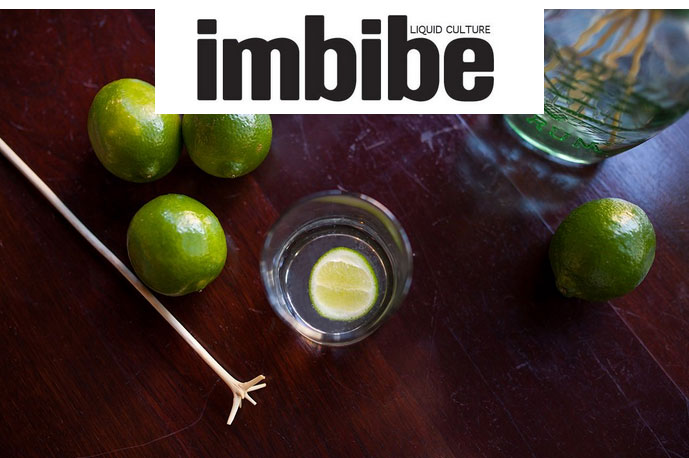
The Rum Reader, the exciting new rum-centric online publication, was launched in September by Ben Schaffer, who co-authored The Dead Rabbit Drinks Manual. Ben took a few minutes to chat with The Sugarcane Press.
You’ve just launched The Rum Reader. Tell us about the publication, and how it’s different than other rum or spirits sites.
The Rum Reader was created with two goals: to help people discover and explore their own preferences in rum, and to produce substantive feature writing with rum as a jumping-off point.
There’s more writing about spirits, and rum in particular, than ever. That’s exciting, but I was finding that a lot of it either read like a trade publication, letting us know what producer rolled out what product, or was simply a review of those products. There are reviewers who are eloquent and evocative, but that makes me wish they were writing an
analysis rather than a review. Reviews exist to issue you opinions rather than helping you form them. So many more people are encountering great rum these days, and they need tools to navigate.
The Rum Reader is interested in rum, but it’s also interested in the things that touch rum. Rum is part of Caribbean culture, so let’s also investigate cuisine, music, literature, travel, history—every aspect of the Caribbean and how the Caribbean has influenced the world.
I think most people will agree that a huge part of being interested in spirits is the conviviality. You could drink at home if you just want to drink. But you go out because you want to experience other humans. We want the Rum Reader to be analogous to a cocktail party full of fascinating people, not a laboratory where rum samples are
measured. (Of course, some of the fascinating, creative people at that party are the rum technicians!)
Who do you hope reads The Rum Reader?
It’s important to me that the Rum Reader can serve those who already know a million things about rum as well as those who are just beginning their rum journeys. Although we always have the rum community in mind, we want to welcome more people into that community.
Most of all, I want to offer just good, old fashioned writing, which I think has broad appeal. Profiles of compelling people should be compelling even if the passions of the subjects are not precisely the same as the passions of the reader. Learning about thought-provoking new things is one of the main pleasures in reading for me, and for the many people who feel as I do, I hope you will take a look at the Rum Reader.
What is your background in rum? And/or journalism?
I love many kinds of spirits and always have. I think that Americans typically have less exposure to rum, so when I realized how good rum could be, it quickly became a focus of my spirit explorations. This was at a time when less rum was being imported here, but fortunately I’ve lived to see the current bonanza of Caribbean bottlings appearing in the States.
You used to read on dust jackets about an author’s credentials as stevedore and roustabout. I’ve had a similarly eclectic career, although generally indoors. My first big connection to the world of drinks writing was creating all the written marketing material for the first few years of that juggernaut bar, the Dead Rabbit. That culminated in writing
its well-received cocktail book in 2015.
What places in the Caribbean, and/or styles of rum, most inform your rum writing?
I don’t pretend to be an expert on the many different cultures of the Caribbean, but I am always trying to learn more. I know Barbados a little bit, the British Virgin Islands a little less, and Puerto Rico even less than that. There are about 7,000 islands in the Caribbean, so I still have work to do.
The Caribbean is populated by people from just about every other region of the world. It’s informed by everything else, which is one of its significant attributes. To many folks from North America and Europe, the word “Caribbean” means sandy beaches and balmy breezes—an equivalence to literal paradise. But paradise doesn’t have culture, and the Caribbean does. You don’t need people to have beaches and breezes, and the people of the Caribbean are the crucial part. By all means, enjoy your rum by the sea, but search a little more.
What are your thoughts on rhum agricole and fresh sugarcane juice rums?
Rhum agricole is damned important. It’s fascinating to me that such different flavors can be found in rum from sugarcane juice and rum from sugarcane molasses. We should be even more impressed by this versatility of the cane.
The first agricole I fell in love with was the Clément VSOP. I still admire it greatly, but these days I find myself drawn more to the unaged expressions, which I understand is also how most folks in Martinique feel. If you’re going for the nuances of agricole, you might as well get right into the pure distillate, and leave aside the flavor effects of the barrels. Pass the Canne Bleue, please.
I know every liquor producer wants the product to be sipped in a snifter and not mingled with other flavors. But let’s also take a moment to consider the excitement of cocktails with agricole. There’s another dimension to a drink that includes an agricole, and I don’t think that bartenders have even scratched the surface of the possibilities.
What’s your favorite rum cocktail recipe?
It’s hard to find anything to rival the simple pleasure of a Daiquiri. Unless it’s a Rum Punch, which of course is a rum sour variant just as the Daiquiri is. For me, it’s not about the best cocktail overall, but the best cocktail for the situation. If you’re eating oysters, a Gibson seems fitting. A perfect Rob Roy might be nice on a chilly afternoon. But a Daiquiri creates its own appropriate situation.






